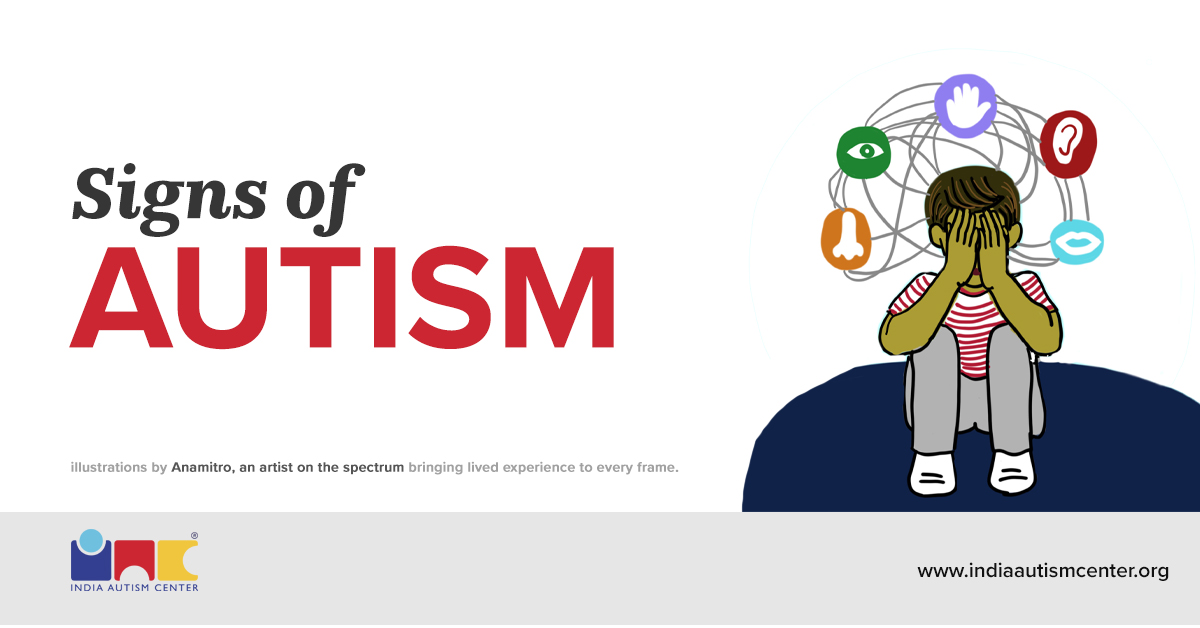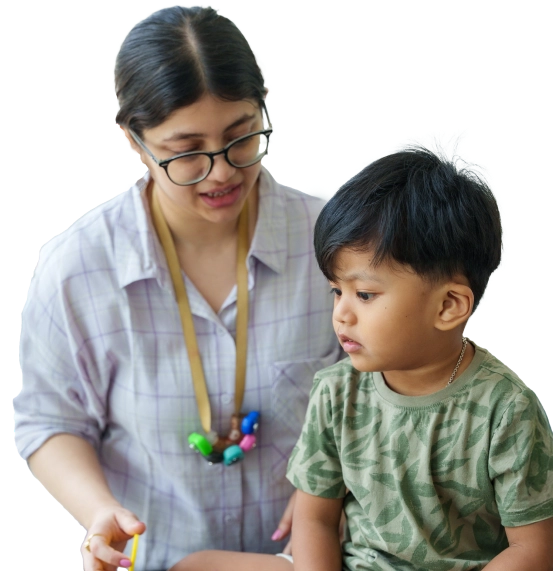Signs of autism refer to early developmental differences associated with Autism Spectrum Disorder (ASD), a complex neurodevelopmental condition marked by challenges in social interaction, communication, and repetitive behaviours. These signs can vary widely in how they appear and develop from child to child.
While ASD is most often diagnosed in early childhood, there is increasing awareness of the importance of recognizing the symptoms of autism as early as infancy, including in newborns. Early identification enables timely intervention and appropriate support, which can greatly enhance developmental outcomes and provide families with clearer guidance and reassurance.
What is Autism in Newborns?
Autism in newborns refers to the presence of early signs and symptoms of ASD within the first few months of life. While definitive diagnosis typically occurs later, heightened awareness of potential indicators in newborns is crucial for early intervention and support. The earliest manifestations of autism can often be subtle, making it essential for parents to be vigilant in observing their newborn’s behaviours and developmental milestones.
Can you tell if a Newborn has Autism?
- Signs of autism in newborns may manifest subtly, but attentive parents can pick up on certain cues.
- One of the earliest indicators is limited eye contact. Newborns later diagnosed with ASD often display reduced eye contact from an early age, indicating potential difficulties in social interaction.
- Additionally, observing newborns for unusual motor patterns, such as repetitive movements or arching of the back, can provide early clues suggestive of autism.
- Furthermore, a typical response to stimuli, such as heightened sensitivity or indifference to sensory input like sound, touch, or light, may also be observed in infants with ASD.
Signs of Autism in Newborns
While most children are diagnosed with autism at an older age, some parents notice signs as early as infancy. Keep in mind that all babies develop at their own pace, but being aware of potential signs can help you seek timely intervention. Recognizing signs of autism in newborns involves being attuned to behavioural patterns and developmental milestones. Key signs include:
1. Delayed Milestones
Parents should monitor their newborn’s developmental progress, such as smiling, babbling, and responding to stimuli, as delays in these areas could signal ASD.
2. Difficulty with Social Interaction
Limited responsiveness to caregivers’ voices or facial expressions may indicate challenges in social engagement, a hallmark feature of autism.
3. Repetitive Behaviours
Even in infancy, repetitive behaviours like hand flapping or rocking may emerge, providing early indications of ASD.
Want to learn more? Get in touch with us.
Early Signs of Autism in Newborns
Early signs of autism in newborns often overlap with those observed in older infants.
- Vigilant parents may notice unusual facial expressions or a lack of responsiveness to social cues in their newborns.
- Furthermore, a preference for routine, while common in all babies to some extent, may be more pronounced in infants later diagnosed with ASD. These newborns may display heightened distress or agitation when routines are disrupted.
- Additionally, communication challenges, such as difficulty in making eye contact or responding to verbal cues, can also signal potential communication difficulties associated with ASD.
Newborn Arching Back Autism: A Red Flag?
- Newborn arching back autism can be a cause for concern, particularly when accompanied by other symptoms.
- While occasional arching is normal, persistent arching, especially during interactions or in response to stimuli, could warrant further evaluation for autism spectrum disorder.
- Parents need to observe the context in which the arching occurs and discuss any concerns with healthcare professionals.
- Remember that early recognition and intervention play a vital role in supporting a child’s development.
- If you notice any unusual behaviours in your newborn, don’t hesitate to discuss them with healthcare professionals.
- Trust your instincts and seek guidance—it can significantly affect your child’s well-being.
Newborn Eye Contact Autism: A Red Flag?
Infant eye contact autism is a powerful form of communication, even in the earliest stages of life. As parents, we eagerly await those moments when our newborn gazes into our eyes, forging a connection that transcends words. However, what if your baby seems to avoid eye contact? Could this be a sign of something more?
Research suggests that eye contact in infants can indeed provide early clues about ASD. Here’s what you need to know:
- Normal Eye Contact Development:
- Babies typically begin making eye contact around 2 months of age. It’s a delightful milestone as they lock eyes with caregivers and explore their world visually.
- However, a study found that a decline in eye contact between 2 and 6 months might signal something significant.
- The Autism Connection:
- Researchers discovered that infants who consistently show reduced attention to others’ eyes during their first few months of life are more likely to receive an autism diagnosis by the age of 3.
- This decline in eye contact serves as an early marker for autism.
- Why It Matters:
- Early detection of autism is crucial. When parents notice subtle signs like diminished eye contact, they can seek professional evaluation promptly.
- Intervention during the early developmental stages can significantly impact a child’s progress.
- What to Observe:
- Pay attention to how your baby engages visually. Is there a consistent lack of eye contact during interactions?
- Context matters: Consider whether the avoidance occurs during play, feeding, or bonding moments.
Remember, every child is unique, and variations in development are normal. However, if you have concerns about your baby’s eye contact, trust your instincts.
Seeking Professional Guidance
- If parents notice any of the aforementioned signs of autism in their newborn, it’s essential to seek guidance from healthcare professionals specializing in early childhood development.
- Pediatricians, developmental pediatricians, or child psychologists can provide valuable insights and recommend appropriate assessments or interventions.
- Early intervention programs tailored to the needs of infants with ASD can significantly improve outcomes. This is done by addressing developmental delays and promoting social and communication skills.
- IAC is committed to creating impactful change in the lives of autistic individuals advocate for evidence-based practices to improve eye contact by encouraging activities to improve eye contact in autistic individuals.
Conclusion
Early identification of autism symptoms in newborns is vital for initiating timely interventions and support. By understanding the signs and proactively seeking guidance, parents can play a pivotal role in promoting their child’s well-being and developmental outcomes.
While each child develops at their own pace, early recognition and support can make a significant difference in the journey of a child if we can understand the spectrum properly.
FAQs
What are the early signs of autism in newborns?
Early signs of autism in newborns can involve minimal facial expressions, lack of social smiling, or reduced interest in human interaction.
Are there specific autism newborn signs parents should watch for?
Autism newborn signs may include poor visual tracking, limited response to caregivers, and unusually low or high sensitivity to touch or sound.
Can you tell if a newborn has autism?
It is not possible to definitively diagnose autism in newborns. Clinical diagnosis usually becomes reliable as developmental patterns emerge.
How do you know if your newborn has autism?
Parents may notice developmental differences over time, but only a professional evaluation can determine whether autism traits are present.
Is autism in newborns diagnosed at birth?
Autism in newborns is not typically diagnosed at birth. Most diagnoses occur during toddler years after developmental monitoring.
Do newborns with autism show clear symptoms?
Newborns with autism do not usually show clear or diagnosable symptoms immediately, as autism is identified through developmental progression.
When should parents seek help if they notice autism newborns signs?
If parents notice persistent developmental concerns, they should consult a pediatrician or developmental specialist for guidance and monitoring.
For expert insights, support services, and inclusive learning initiatives, contact India Autism Center for more information.




![A Guide to the Challenges in Autism [2026]](https://indiaautismcenter.org/wp-content/uploads/2023/12/23.webp)

